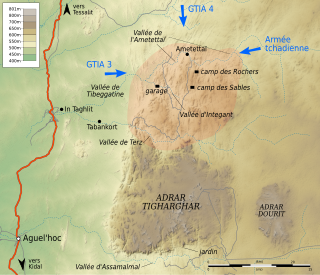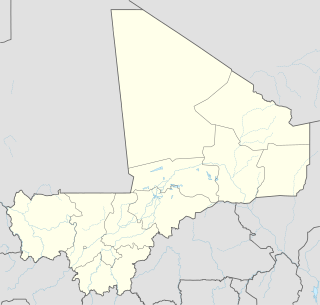Notes and references
Notes
- ↑ Some sources, such as Le Figaro, state that he served for thirty years and was an officer.
- ↑ According to Serge Daniel, correspondent of France 24 to Bamako who met with Le Guen. Quoted in Gilles Le Guen..., France24
- ↑ "rendra notre lutte légitime comme celle de nos frères d'Afghanistan et de Palestine. Nous nous battrons jusqu'au bout". Quoted in Le djihadiste français Gilles Le Guen arrêté au Mali, Le Figaro
- ↑ "C'est un paumé qui devient terroriste". Quoted in Le Figaro
Related Research Articles

The insurgency in the Maghreb refers to the Islamist insurgency in the Maghreb and Sahel regions of North Africa that followed on from the end of the Algerian Civil War in 2002 to the present day. The Algerian militant group Salafist Group for Preaching and Combat (GSPC) allied itself with al-Qaeda to eventually become al-Qaeda in the Islamic Maghreb (AQIM). The Algerian and other Maghreb governments fighting the militants have worked with the United States and the United Kingdom since 2007, when Operation Enduring Freedom – Trans Sahara began. While the 2011 Arab Spring affected support for the insurgency, it also presented military opportunities for the jihadists. In 2012, AQIM and Islamist allies captured the northern half of Mali, until being fought back less than a year later following a French-led foreign intervention, which was succeeded by the Sahel-wide Operation Barkhane. In Libya, the ISIL/ISIS/IS/Daesh has been able to control some limited territory in the ongoing civil war since 2014, amid allegations of local collaboration between the rival AQIM and ISIL.

The Battle of Gao was fought between the National Movement for the Liberation of Azawad (MNLA) and the Islamist Movement for Oneness and Jihad in West Africa (MOJWA), along with its ally Ansar Dine, in Gao between 26–28 June 2012. By the 28 June, Gao, Timbuktu and Kidal, the three biggest cities in the disputed secessionist region of Azawad within what is recognised as Malian territory, were under the control of Ansar Dine and its Islamist allies.

The Battle of Ifoghas, also known as the Battle of Tigharghâr or the Battle of the Ametettai, took place from 18 February to 31 March 2013, during the Northern Mali conflict. The French army and the Chadian army fought armed Salafist jihadist groups led by Al Qaeda in the Islamic Maghreb and Ansar Dine. After being defeated in January in the Battle of Konna and the Battle of Diabaly, the jihadists abandoned Timbuktu and retreated into the Adrar Tigharghar, a mountain of the Adrar of Ifoghas in northeastern Mali, which has been their sanctuary for years. The French started quickly a pursuit, and they took control of the towns of Tessalit and Aguelhok and begun the operation Panther in the Tigharghar. The first clashes erupt on February 18 and are mainly concentrated in the Ametettai Valley. It is caught between two armored columns, one French to the west and another Chadian to the east, while the paratroopers manage to surprise the jihadists by attacking on foot from the north. The valley is taken on March 3 and jihadists begin to gradually abandon the Tigharghar. Excavation missions and some skirmishes, however, continue to take place the following days. The operations cease on March 31. The battle was a turning point in the war, as with the capture of the Tigharghar, the jihadists lose their main sanctuary in the Sahel as well as most of their military arsenal, taken from the Malian army or Libya.

Operation Serval was a French military operation in Mali. The aim of the operation was to oust Islamic militants from the north of Mali, who had begun a push into the center of Mali.

The Battle of Konna was a battle in the Northern Mali Conflict in the town of Konna in central Mali. Various Islamic fundamentalist rebels fought with the government of Mali, the latter of which was supported by French soldiers participating in Operation Serval. This battle was among the first French engagements in their intervention in the Mali War.

The Battle of Diabaly was fought between government forces of Mali, against groups of Islamists militants such as the AQIM and Ansar Dine. The Islamists held control of Diabaly for no longer than a week until Malian forces with the help French air strikes recaptured the town.

The following is a timeline of major events during the Northern Mali conflict.

The Second Battle of Gao was the recapture of the city of Gao from Islamist MOJWA fighters by Malian/French forces. It took place in January 2013 within the Northern Mali Conflict.

Operation Panther was a French military operation in Mali that was launched in February 2013.
The Battle of Iminenas was an armed confrontation between French-Malian forces and the Jihadists terrorist groups, Movement for Oneness and Jihad in West Africa and Al-Mulathameen. The battle was a decisive Franco-Malian victory, as it resulted, according to the French and the Malian governments, in 52 Islamists being killed, with no government forces being killed.

The Battle of Timbuktu occurred in Timbuktu, Mali, in March 2013, between Islamist groups and Mali government forces supported by France.

On March 23, a battle took place in Gao between MUJAO and Malian army. The Malian army repelled the attack.

The Battle of Timbuktu was a phase of the Northern Mali conflict, taking place in late March 2013, in which two Islamist attacks targeted the Malian army in Timbuktu. With help from the French, both attacks were prevented from capturing any significant sites in the city.

Operation Barkhane is an ongoing anti-insurgent operation that started on 1 August 2014, and is led by the French military against Islamist groups in Africa's Sahel region. It consists of a roughly 5,000-strong French force, which is permanently headquartered in N’Djamena, the capital of Chad. The operation is led in co-operation with five countries, all of which are former French colonies that span the Sahel: Burkina Faso, Chad, Mali, Mauritania and Niger. The countries are collectively referred to as the "G5 Sahel". The operation is named after a crescent-shaped dune in the Sahara desert.

Nusrat al-Islam, officially known as Jama'a Nusrat ul-Islam wa al-Muslimin' is a militant jihadist organisation in the Maghreb and West Africa formed by the merger of Ansar Dine, the Macina Liberation Front, Al-Mourabitoun and the Saharan branch of Al-Qaeda in the Islamic Maghreb. It is the official branch of Al-Qaeda in Mali, after its leaders swore allegiance to Ayman al-Zawahiri.

The Battle of Idelimane took place during the Internal Conflict in Azawad.
The Battle of Timetrine was a battle between French forces and al-Qaeda in the Islamic Maghreb (AQIM) militants in Timetrine, in Tessalit.

The Battle of Talahandak took place on 3 June 2020 during the Mali War. It resulted in the death of Abdelmalek Droukdel, the leader of al-Qaeda in the Islamic Maghreb (AQIM).
Mahmoud Dicko is a Malian Salafi imam from the Tombouctou Region who chaired the High Islamic Council of Mali from January 2008 to April 2019.

The Jihadist insurgency in Burkina Faso is an ongoing war and civil conflict between the Government of Burkina Faso and Islamist rebels.
References
- 1 2 3 4 5 6 7 8 9 Gilles Le Guen, Breton sailor who 'followed bin Laden', France24
- ↑ Le djihadiste français Gilles Le Guen arrêté au Mali, Le Figaro
- 1 2 3 4 Comment Gilles Le Guen a été capturé au Mali, Dominique Merchet, Secret Défense
- 1 2 3 Qui est Gilles Le Guen, le djihadiste français arrêté au Mali?, L'Express
- 1 2 3 4 5 6 Le djihadiste français au Mali : "une dérive individuelle de fanatisme", lemonde.fr
- 1 2 3 Mali. Un djihadiste appelé Gilles Le Guen arrêté par les islamistes, Le Télégramme
- ↑ Le djihadiste français Gilles Le Guen arrêté au Mali, lemonde.fr
External links
- (in French) Comment Gilles Le Guen a été capturé au Mali, Dominique Merchet, Secret Défense
- (in English) Gilles Le Guen, Breton sailor who 'followed bin Laden', France24
- (in French) Le djihadiste français au Mali : "une dérive individuelle de fanatisme", lemonde.fr
- (in French) Qui est Gilles Le Guen, le djihadiste français arrêté au Mali?, L'Express
- (in French) Le djihadiste français Gilles Le Guen arrêté au Mali, lemonde.fr
- (in French) Mali. Un djihadiste appelé Gilles Le Guen arrêté par les islamistes, Le Télégramme
- (in French) Le djihadiste français Gilles Le Guen arrêté au Mali, Le Figaro
- (in English) French Islamist captured ‘after fighting’ in Mali, BBC